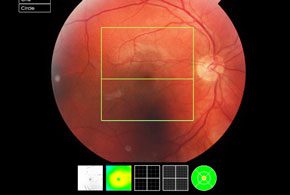Google DeepMind is engaged in a medical research partnership with England’s Moorfields Eye Hospital, in an effort to more quickly and effectively treat eye conditions and help more people avoid preventable diseases.
Moorfields is the oldest eye hospital in the world, fielding 600,000 patient visits a year, which it says is more than twice that of any other hospital in the United States or Europe.
Every week, it performs thousands of eye scans—noninvasive procedures that produce tremendous amounts of useful information. Because of their size and detail, however, they take a considerable amount of time to analyze, slowing treatment.
“This is where DeepMind [an artificial intelligence company owned by Google] is able to help us understand these huge data sets and then put it together … toward making a good diagnosis and achieving the best possible treatment for our patients,” Peng Tee Khaw, a consultant ophthalmic surgeon and director of Moorfields, said in a video shared with the announcement.
Under the terms of the partnership, Moorfields will share 1 million anonymized eye scans (meaning, they won’t be identifiable to any individual) with DeepMind, which will train algorithms to spot early signs of disease and other useful information that professionals know to look for.
“If you have an OCT scan done, a machine-learning algorithm will be able to tell you if it’s something urgent versus something that’s not so urgent,” Pearse Keane, a consultant ophthalmologist with Moorfields, said in the video.
“It will allow us to get much earlier detection of these blinding diseases, and as a result of that I think we’ll get much earlier intervention and much earlier treatment for these patients,” Keane added.
In the United Kingdom alone, 2 million people are living with sight loss and 360,000 are registered as blind or partially sighted, according to DeepMind. By 2050, sight loss in the UK is expected to double. (According to the U.S. Centers for Disease Control and Prevention, 3.4 million Americans aged 40 and older are blind or visually impaired.) Here are more eye-related metrics as published by LESH (Laser Eye Surgery Hub, a UK-based eye health research blog.
Again, in just the United Kingdom, age-related macular degeneration (AMD) is predicted to affect 2.5 million adults by 2020. Wet AMD, a more serious form of the disease, is likely to make up 15 percent of those cases, and its subtle features are particularly difficult to spot.
“AMD is a devastating condition and delays due to pressure on eye clinics have resulted in some people suffering unnecessary sight loss,” Cathy Yelf, chief executive of the Macular Society, said in a statement supporting the initiative. “This technology could ease that pressure if it can accurately diagnose conditions such as wet AMD resulting in urgent referrals for only those that need them.”
DeepMind co-founder Mustafa Suleyman, in a separate statement, said that such projects are exactly why the company was founded.
“We set up DeepMind because we wanted to use AI [artificial intelligence] to help solve some of society’s biggest challenges,” said Suleyman, “and diabetic retinopathy is the fastest growing cause of blindness worldwide. There are more than 350 million sufferers across the planet.”
Early detection, he added, “gives patients the best possible chance of getting the right treatments.”
In June, Google announced the creation of a dedicated machine learning research team in Europe, based out of its Zurich office. The group, it said, will focus on three areas: machine intelligence; natural language processing and understanding; and machine perception, which includes teaching machines to understand images, sounds and video.
Emmanuel Mogenet, head of Google Research, Europe, said in a post that the team will actively look for ways to improve its machine learning infrastructure, as well as ways to put it “to practical use.”
